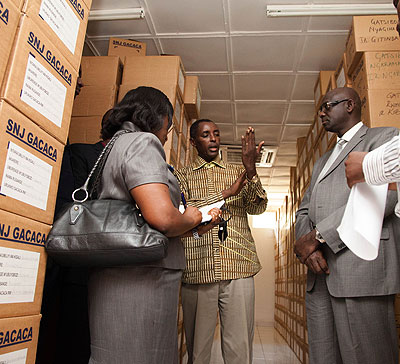The Minister for Justice has called for more secure measures to preserve Gacaca archives amid concerns of the risk of fire outbreak which could destroy the material.


The Minister for Justice has called for more secure measures to preserve Gacaca archives amid concerns of the risk of fire outbreak which could destroy the material.
The Gacaca archives are papers used to document trials during the grassroots hearing of cases of 1994 Genocide against the Tutsi.
The 60 million pages of A4 papers, packed in 16,545 boxes, are currently stored at the Police headquarters in Kacyiru, and jointly managed by the National Commission for the Fight against Genocide (CNLG) and Aegis Trust Rwanda.
While visiting the archives on Wednesday, Johnston Busingye, together with several government and police officials, appreciated the efforts towards preserving the archives but expressed concern over the risk of a fire outbreak.
The archives, made of paper and audio-visual materials, were put together two years ago after the closure of the Gacaca courts.
They were collected from over 400 sectors in the country.
Gacaca courts, which won international acclaim in their 10-year period of operation, tried a total of 1,951,388 Genocide cases.
More than 75,000 suspects convicted by Gacaca courts are still on the run.
"We still need to build a safe and secure system that would help all people access the files easily,” said Minister Busingye.
Jean de Dieu Mucyo, the Executive Secretary of CNLG, said efforts are underway to ensure proper storage of the documents.
"We have a team of experts from the US and Europe who are coming to share with us skills on safe storage,” Mucyo said.
The Director of Aegis in Rwanda, Freddy Mutanguha, said his organisation has the technology to digitise the archives but needs financial and human resources to do that.
Some of the options cited include building automated moving shelves that can close themselves, an underground storage, or digitise the archives and store them online.
Aegis Trust says a study on how to manage the archives is set to commence next month and will be completed by October.


